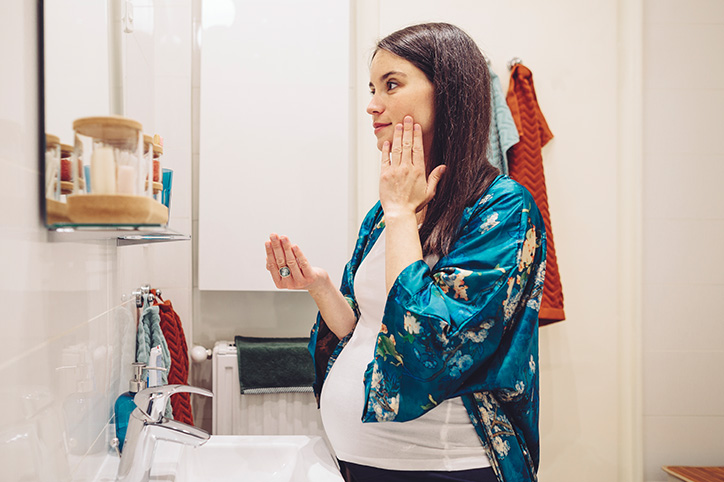There’s no good time for acne. It doesn’t matter if you’re a teen, pregnant or in any other stage of your life. The reason why getting it during pregnancy or when you’re trying to conceive is particularly problematic is that many of the common OTC acne-treating ingredients, and certainly the strong prescription ones like Accutane, are not part of safe treatment option plans. So what does one do about pregnancy acne?
What causes acne in pregnancy?
Acne is very common during pregnancy. “High levels of hormonal shifts occur during pregnancy, especially in the first trimester that drive oil-production, which can lead to blockages and thus breakouts,” says Dr. Robert Finney, board-certified cosmetic dermatologist at Entière Dermatology. “Anyone who is breakout prone should only use products on their face that are not also going to clog their pores and worsen the problem.” Nothing that touches your face should have oil! A label that says non-comedogenic isn’t enough; make sure to read the ingredients list to confirm that there are no oils.
Luckily there are some good acne fighting ingredients that are pregnancy safe. “Look for products with glycolic acid, azaleic acid or niacinamide,” says Dr. Finney. Having a good skincare regimen that involves chemical exfoliation (with ingredients like the aforementioned acids) is important to prevent pores from getting clogged. Dr. Dennis Gross Skincare Alpha Beta Universal Daily Peel Pads are safe to use daily during pregnancy to not only treat and prevent acne, but they’ll leave your skin glowing after a single use (seriously). They’re the only two-step peel on the market meaning these peel pads are as close as you’ll get to an in-office treatment at home.
“Patients should also still continue to wear sunscreen daily and moisturize the skin daily to make sure their barrier stays healthy, intact and protected from the sun. My favorite sunscreen personally and for acne prone skin is EltaMD UV Clear which is lightweight, non-comedogenic and has niacinamide to help control oil production.” Sunscreen is also key for preventing dark spots – another common pregnancy skincare issue.
Does acne go away after birth?
It’s unpredictable. “Many women suffer from hormonally driven acne irregardless of pregnancy, so if you had acne prior and it worsened during pregnancy then you will likely still have it after birth. Another factor affecting hormone levels is breastfeeding. If you breastfeed, hormone shifts are still occurring which can trigger breakouts. Often, once one is no longer pregnant or breastfeeding, hormone levels normalize and breakouts stop.”
Putting together an acne skincare regimen
Dr. Finney says a good place to start when putting together a regimen would be to include a wash or lotion with glycolic acid. “Glycolic acid helps exfoliate, unclog and shrink pores, brighten the skin and diminish dark marks, and stimulate collagen to help fight fine lines and wrinkles.” If lesions are more inflammatory he recommends prescription strength clindamycin lotion. “Acne can build up resistance if this is not used in combination with benzoyl peroxide, which is generally accepted to be safe under a concentration of 5%.”
You’ll also want to keep your skin moisturized with an oil-free moisturizer and you can opt for spot treatments as well. Other popular ingredients generally considered safe are salicylic acid, as long as the concentration is less than or equal to 2%, zinc and niacinamide. Click here for a helpful report on safe skincare ingredients during pregnancy.
“It’s difficult to determine what is safe during pregnancy because rightfully so, no one wants to subject themselves to testing while pregnant, so many ingredients are deemed to be unsafe, simply because there is little to no data,” says Dr. Finney. “Things that I tell patients to avoid are: hydroquinone, retinoids, arbutin, chemical sunscreens. For other, I tell them these are generally considered safe, but you should always check with your doctor on what they feel comfortable with.”
